Unit4 Making the news 第1课时
- 格式:doc
- 大小:39.50 KB
- 文档页数:3
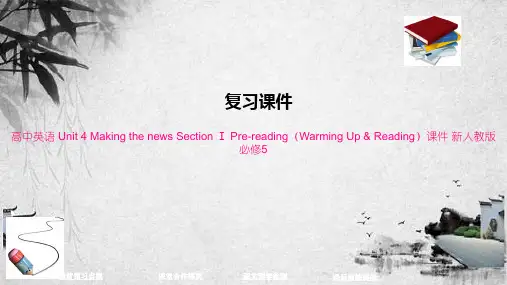
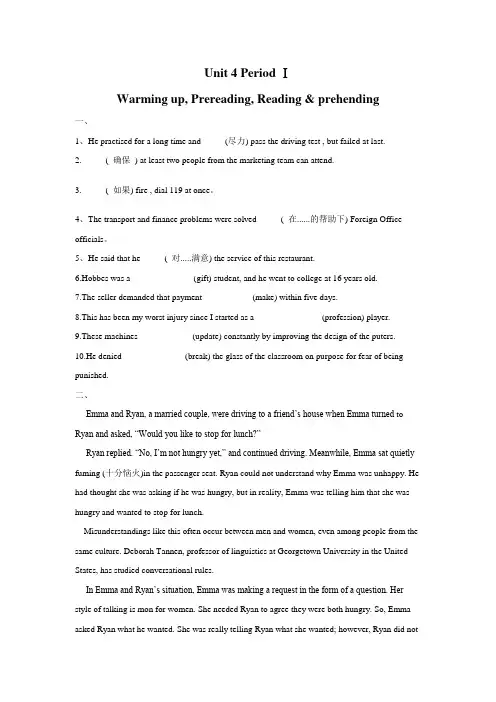
Unit 4 Period ⅠWarming up, Prereading, Reading & prehending一、1、He practised for a long time and (尽力) pass the driving test , but failed at last.2. ( 确保) at least two people from the marketing team can attend.3. ( 如果) fire , dial 119 at once。
4、The transport and finance problems were solved ( 在......的帮助下) Foreign Office officials。
5、He said that he ( 对.....满意) the service of this restaurant.6.Hobbes was a ______________(gift) student, and he went to college at 16 years old.7.The seller demanded that payment ___________(make) within five days.8.This has been my worst injury since I started as a _______________(profession) player.9.These machines ____________(update) constantly by improving the design of the puters.10.He denied ______________(break) the glass of the classroom on purpose for fear of being punished.二、Emma and Ryan, a married couple, were driving to a friend’s house when Emma turned to Ryan and asked, “Would you like to stop for lunch?”Ryan replied. “No, I’m not hungry yet,” and continued driving. Meanwhile, Emma sat quietly fuming (十分恼火)in the passenger seat. Ryan could not understand why Emma was unhappy. He had thought she was asking if he was hungry, but in reality, Emma was telling him that she was hungry and wanted to stop for lunch.Misunderstandings like this often occur between men and women, even among people from the same culture. Deborah Tannen, professor of linguistics at Georgetown University in the United States, has studied conversational rules.In Emma and Ryan’s situation, Emma was making a request in the form of a question. Her style of talking is mon for women. She needed Ryan to agree they were both hungry. So, Emma asked Ryan what he wanted. She was really telling Ryan what she wanted; however, Ryan did notunderstand this. If he had been hungry, he would have said something more direct, such as, “I’m hungry. Let’s have lunch.”Tannen believes that most women grow up in a world where talk is used to express feelings. However, most men are raised differently and they tend to keep their feelings to themselves.Tannen says, for men, talk is often used as a situation used outside the home to gain respect, to entertain and get attention , or to exchange information. This is why men municate by making each other laugh, or talking about sport and work. These men do not always feel it is necessary to talk to feel close or to express their feelings. Women, on the other hand, are encouraged to speak about their feelings since this is a way to build relationships.1.What can be inferred from Emma and Ryan’s story?A.Emma didn’t like Ryan.B.Ryan didn’t want to talk to Emma.C.Ryan didn’t want to eat with Emma.D.Emma wasn’t pleased with Ryan’s answer.2.According to Deborah Tannen, what causes the misunderstanding?A.Different culturesB.Different characteristicsC.Different ways of municatingD.Different educational background3 pared with women, men_______.A.talk less about feelingsB municate more with othersC.are more likely to bee angryD.are better at building relationships4.What might be the best title for the text?A.Why women like to express feelingsB.How men and women municateC.Different ways of supporting a childD.Misunderstandings in social munication三、I was a paperboy — well actually, the first papergirl in Seattle. When I was 12, I talked my way into a job delivering The Seattle Times. I remember the boss looking this 1____ girl over and telling me I had a week to 2_____ I could do it.So after school, I would 3______ over to the hut down the street, pick up my bundles, lift them onto the back of my 4_______ and ride my route. Sunday morning papers were too 5_______ for me to carry. I tried, and it took me three hours to 6______ them as I had to keep ing back to reload. So, my mother volunteered to get up at 5: 30 am and drive me around. She 7_______ herself to my employment.What I learned as a 8 ______was to find out where each of my customers wanted their papers.I didn’t just throw them on their 9 ______If they wanted them on their porch, or mailbox or inside the gate, that was 10 _____they got them. When a customer went out of town, he would tell me and I would make sure that the papers didn't11 ______up to flag thieves. In return, I got big 12_______.Somewhere the paperboys are13______ by modem services. We put our orders, our vacation holds, our moves into online forms that then tell a service that14_______ a guy in a truck to throw the paper onto the lawn.The people that run and own newspapers have the15 ______to deliver news to us in a large number of forms, and we should be able to get it any way we want. We should be able to16______ for the form we want it 17_______, including how it is distributed. I would 18________pay to have a papergirl or boy deliver the 19 _______on the right day in the right way, and I would tip for that privilege.Let’s bring back the paperboy and with it 20_______ ad B.paper k D.speech 20.A.fortunate B.positive eless D.meaningful答案以及解析一、1. tried to2. Make sure3. In case of4. with the assistance/help of5. was delighted with6.答案:gifted解析:考查形容词。
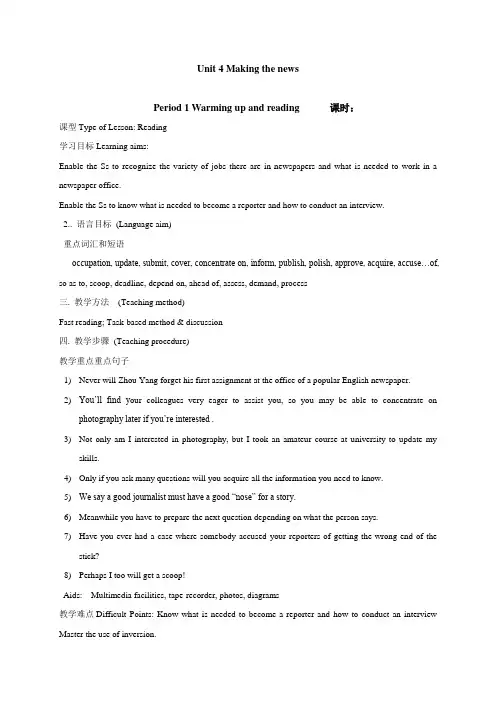
Unit 4 Making the newsPeriod 1 Warming up and reading 课时:课型Type of Lesson: Reading学习目标Learning aims:Enable the Ss to recognize the variety of jobs there are in newspapers and what is needed to work in a newspaper office.Enable the Ss to know what is needed to become a reporter and how to conduct an interview.2.. 语言目标(Language aim)重点词汇和短语occupation, update, submit, cover, concentrate on, inform, publish, polish, approve, acquire, accuse…of, so as to, scoop, deadline, depend on, ahead of, assess, demand, process三. 教学方法(Teaching method)Fast reading; Task-based method & discussion四. 教学步骤(Teaching procedure)教学重点重点句子1)Never will Zhou Yang forget his first assignment at the office of a popular English newspaper.2)You’ll find y our colleagues very eager to assist you, so you may be able to concentrate onphotography later if you’re interested .3)Not only am I interested in photography, but I took an amateur course at university to update myskills.4)Only if you ask many questions will you acquire all the information you need to know.5)We say a good journalist must have a good “nose” for a story.6)Meanwhile you have to prepare the next question depending on what the person says.7)Have you ever had a case where somebody accused your reporters of getting the wrong end of thestick?8)Perhaps I too will get a scoop!Aids: Multimedia facilities, tape-recorder, photos, diagrams教学难点Difficult Points: Know what is needed to become a reporter and how to conduct an interview Master the use of inversion.教学反思Teaching Re-thinking:家庭作业Homework:教学过程Teaching Procedures:一. 教学目标(Teaching aims)1. 能力目标(Ability aim)Period 1Step I Warming up. ( see page 25 )Can you tell some jobs in a newspaper company? What are their jobs involves?Teaching suggestions: rearrange the order of the types of jobs a newspaper has and what they involve And ask the students to do the matches. Then ask them to copy what’s on the screen to their books. At the same time deal with the new words:occupation and journalist and the expression: suppose you were…occupation =a job or professionTeaching is my occupation. 教书是我的职业.。

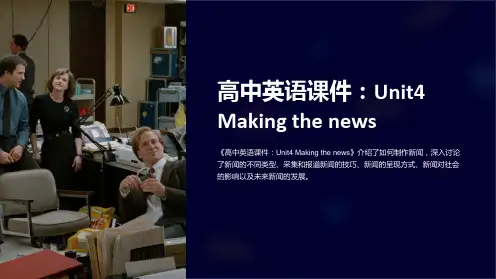

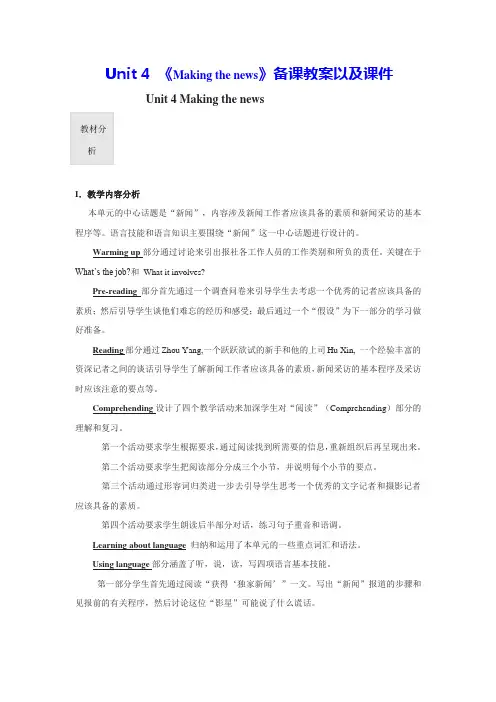
Unit 4 《Making the news》备课教案以及课件Unit 4 Making the newsI.教学内容分析本单元的中心话题是“新闻”,内容涉及新闻工作者应该具备的素质和新闻采访的基本程序等。
语言技能和语言知识主要围绕“新闻”这一中心话题进行设计的。
What’s the job?和What it involves?素质;然后引导学生谈他们难忘的经历和感受;最后通过一个“假设”为下一部分的学习做好准备。
资深记者之间的谈话引导学生了解新闻工作者应该具备的素质,新闻采访的基本程序及采访时应该注意的要点等。
理解和复习。
第一个活动要求学生根据要求,通过阅读找到所需要的信息,重新组织后再呈现出来。
第二个活动要求学生把阅读部分分成三个小节,并说明每个小节的要点。
第三个活动通过形容词归类进一步去引导学生思考一个优秀的文字记者和摄影记者应该具备的素质。
第四个活动要求学生朗读后半部分对话,练习句子重音和语调。
第一部分学生首先通过阅读“获得‘独家新闻’”一文。
写出“新闻”报道的步骤和见报前的有关程序,然后讨论这位“影星”可能说了什么谎话。
第二部分首先听一段对篮球明星姚明的采访。
随后的练习设计既训练了学生获取要点的能力,又引导学生如何获取细节。
最后要求学生通过开展两人对话活动复习巩固有关交际功能“约会”的用语。
测。
荐一些给学生,或让学生自己推荐一些他们认为好的英文报纸。
II.教学重点和难点1. 教学的重点:(1) 简要了解新闻工作者应该具备的素质,新闻采访的基本程序及采访时应该注意的要点。
(2) 学习有关新闻工作的生词和短语。
(3) 学会表达约会的日常交际用语。
2. 教学的难点:(1) 学习倒装句(Inversion)的用法。
(2) 学习写新闻报道。
III.教学计划:本单元分六课时:第一课时:Warming up, Pre-reading第二、三课时:Reading, Comprehending第四课时:Learning about Language第五课时:Using Language第六课时:Listening, Speaking, Summing Up, Learning TipsIV.教学步骤:Period 1 Warming Up, Pre-readingTeaching Goals:1. To read and talk about the procedure of making the news.2. To develop Ss’ listening ability.Teaching Procedures:Step 1 Leading-inPurpose: To activate Ss and arouse them to talk about making the news.1. Ask Ss to look at the following pictures and see how much they know about news.2. Group workAsk Ss the question “Do you know how to make the news?” Please discuss in groups.Step 2. Warming Up1. Pair workToday we will learn something about making the news. Suppose you work for China Daily. What types of jobs do you choose? What does it involve? Now in pairs discuss them. Give reasons for your choice.Suggested Answers:2. Individual workAsk Ss to find any kind of newspaper and see the news in it. And let them find what section they like most.Step 3. Competition1.Individual workTake the quiz below and see whether Ss can guess the answers.(1) Which two words mean the same? (journalist/reporter)(2) Who gives opinions on plays and books. (critic)(3) Who reports from abroad? (foreign correspondent)(4) Who decides on the content of the newspaper? (writer and chief editor)(5) Who writes news stories? (reporter or journalist)(6) Who makes corrections to articles and design?(7) Who designs comic drawings with captions? (sub-editor)(8) Who is in charge of the newspaper when the boss is away? (deputy editor)2. Pair workAsk Ss to discuss in pairs which of the above jobs they like best and the reasons.Step 4. Pre-reading1. DiscussionAsk Ss to discuss in pairs what qualities a good news reporter needs to have and then tick the table below.very important important not very important1.Higher level of education2.Work experience3.Good communication skills4.Curious, active personality5.Hard- working character6.Enthusiasm for the job7.Prepared to work long hours8.Ability to work in a team2. Individual workAsk Ss to think about which of the above qualities they have and how they show the qualities.Step 5.Discussion1.Group work2.Ask Ss to discuss in groups the most unforgettable moment in their lives. And then ask them whythey keep it in mind and how they felt at that time.2. PresentationAsk some Ss to talk about their most unforgettable moment in front of the class.3. HomeworkGet Ss to read some magazines and newspapers.Periods 2&3 Reading, ComprehendingTeaching Goals:1. To develop some basic reading skills.2. To arouse Ss’ interest in learning about how to make the newsTeaching Procedures:Step 1. Listening1. Now please listen to the recording of the text My First Work Assignment “unforgettable,” says news reporter. Pay attention to the pronunciation of each word and pauses within each sentence.2. Listen to the tape again and follow in a low voice.Step 2. ReadingPurpose: To get Ss to have some details in the text.1. Read the passage carefully. Write R (right) or W (wrong) in the bracket.(1) Zhou Yang can go out on a story immediately. (F)(2) Only when Zhou has seen what he or she does, can he cover a story by himself. (T)(3) Not only is Zhou interested in photograph, but also he took a course at university, so it’s ac tually of special interest to him. (T)(4) Hu xin has never had a case where somebody accused your reporters of getting the wrong end of the stick. (F)(5) The footballer did tell the truth. (F)(6) The footballer was accused of taking money for deliberately not scoring goals so as to let the other team win. (F)(7)An article was written by Zhou Yang which suggested the footballer was guilty. (F)(8) “A trick of the trade” means clever ways known to experts.(T)2. Pair workSkim the text and underline the questions that Zhou Yang asks. Notice the way the questions develop.◆Can I go out on a story immediately?◆What do I need to take with me?◆What do I need to remember when I go out to cover a story?◆What mistakes must I avoid?◆Why is listening so important?◆How can I listen to answers if I have to write down what he or she is saying?◆Have you ever had a case where somebody accused your reporters of getting the wrongend of the sick?The way the questions develop:All of these questions are finding out more abut the qualities and skills needed for the job. They also start in a general way (what to take with you) and gradually become more specific (anexample of the newspaper being accused of writing an untrue story). The questions develop naturally form the answers of the Hu Xin and yet they form a developmental whole: thins to take, things to remember, things to avoid, importance of listening, ensuring accuracy.3. InterviewLet the students interview each other. One can pretend to be either a film star, a either, a sportsman or woman, or a pop star and the other must find out as much as he/she can about his/her life. Then swap over.4. Important words and phrases(1) professional adj.①职业的;专业的You will need to seek professional advice about your claim for compensation.②具有专门知识的Many of the performers were of professional standard./③职业性质的Professional football, golf, tennis.(2) Photograph①n 照片Have you seen John’s photograph in the newspaper?②v 为……拍照;拍照The man photographed the bride in the wedding.(3) eager adj 热切的;渴望的He was eager for success.She was eager to please her husband.(4) concentrate on 专注于I decided to concentrate on science subjectsThis firm concentrates on the European markets.(5) meanwhile adv 期间;同时She’s due to arrive on Tuesday. Meanwhile, what do we do?I went to college. Meanwhile, all my friends got well- paid jobs.●常见词组:in the meantime 在此期间,与此同时The next programme starts in five minutes, in the meantime, here’s some music.(6) trade①n. 交易,贸易,商业,买卖Trade is always good over the Christmas period.A trade agreementBritain’s trade with EuropeDo a roaring trade②vi 做生意;做买卖Which store do you trade at?I will trade you my stamp collection for your modal boat.(7) case n 事例;情形;实情;情况It’s a clear case of blackmail.Is it the case that the company’s sales have dropped?In your case, we are prepared to be lenient.Cases of smallpox are becoming rare.This boy is a sad case.(8) accuse 起诉He accused his friend of making his car broken.(9) deliberately adv 审慎地;故意地She said it deliberately to provoke me.(10) so as to 为了;以便Check the names carefully so as to avoid mistakes.(11) guilty ad j 有罪的;犯罪的The verdict of the jury was not guilty, that is, innocent.I feel guilty about visiting her so rarely.5. PracticeComplete Sentence B using a word or phrase which has the opposite meaning to the wordsunderlined in Sentence A.B. She _________ broke that beautiful bowl.B. He did not steal the vase so he is _______.B. She can ____________ her studies for a long time.B. The reporter went out with a (an) ___________ photographer.B. Chris is _______ to start his new occupation.B. “This room needs a ________ clean,” explained the housewife.B. The law does not allow people to ________ themselves _____ a crime.B. I want to _______ that skill if it is useful.Suggested Answers: (1) deliberately (2) guilty (3) concentrate on (4) professional (5) eager (6) thorough (7) accuse; of (8) acquireStep 3. Homework1. Use the new words and expressions to make some sentences.2. Try to write a short composition about how to make the news.Period 4 Learning about languageTeaching Goals:•To learn about inversion.••To discover and learn to use some useful structures.•Teaching Procedures:Step 1. Exercise1. Turn to page 27 and do Ex1.Check your answers with your classmates.Suggested Answers:2. Turn to page 28 and do Ex2.Check your answers with your partners.Suggested Answers:(1)deliberately (2) guilty (3) concentrate; on (4) professional (5) eager(6) thorough (7) accus e …of (8) acquire3.Do Ex3. of page 28 and check your answers with your partners.Suggested Answers:Assistant, photographer, delighted, assist, editor, deadline, colleague, amateur, submitted, published, dilemma, assessed, unusual, Meanwhile, scepticalStep 2 Grammar1. Reading and thinkingturn to pages 89-90 to find out what “ inversion” is like, and then find the same structure from the text.2. Exercise(1) Turn to page 29 and finish Ex1. Check the answers with your partners.Suggested Answers:①Never will Zhou Yang forget his first assignment at the office of a popular English newspaper.②Not only am I interested in photography, but I took an amateur course at university to update my skills.③Only if you ask many different questions will you acquire all the information you need to know.(2) Turn to page 29 and finish Ex2. Check the answers with your partners.Suggested Answers:①Neither he nor I knew how to use that recorder.②I only began my work on designing a new bridge then.③There was not only a Christmas tree but also exciting presents under it.④Hu Xin asked the photographer, “Is everything ready yet?”(3) Turn to page 30 and finish Ex3. Check the answers with your partners.Suggested Answers:①Only at a stadium in Beijing will you see so many seats.②seldom have I seen a situation which made me so angry..③Only after you have acquired the information you need will you be able to write a good report.④Never has he given a present to me though he gave a lot (of presents) to his friends.⑤Not only is she good at languages, but also at history and geography.⑥Never before have I read such an exciting report.⑦Not once did she miss a jump when she took part in the horse riding competition.(4) Turn to page 29 and finish Ex4. Check the answers with your partners.Suggested Answers:①Only after my operation, did my neighbors come round to offer me support.②Not once did you come to say you were sorry after breaking my vase.③Seldom have I been so happy as when my son graduated from university.④Only by doing her exercises every day, could Jane hope to run professionally again.⑤Only in a film can people get hit and never seem to feel the pain.⑥Not only did Zhou Jie receive an admission notice to Beijing University, but he also won a scholarship to study in America.⑦Only then did she remember what her aunt told her.3. Explanation of the grammar在英语中,主语和谓语的语序通常是主语在前,谓语在后。
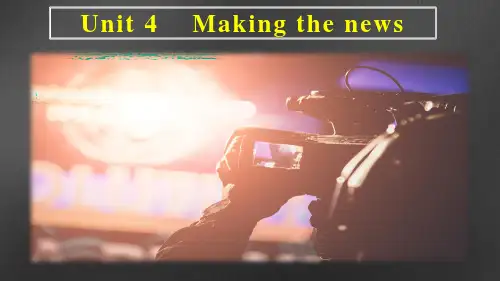

Unit4Makingthenews教案unit 4 making the news教案unit 4 making the newsperiod 1&2 warming up and readingteaching aims:1.enable the students to talk about the qualities needed to be a good reporter and how to conduct a good interview2. enable the students to learn some reading strategies3. enable the students to learn the necessary qualities in their future job important points and difficult pointslearn about how to be a good reporterteaching methodsstrategic reading method; task-based methodteaching procedures:i. elaboration (warming up): help the students to relate their known knowledge to the topic that will be learnedtask 1 :( group discussion) talk about jobs in china daily?types of jobswhat it involvesreportertask2: predict what is going to be learned by looking at the title of the text. which type of job will be talked about in the text?ii. prediction (pre-reading):task 3: predict the main idea of the text by discussing the following questions:1. what are the qualities a good news reporter needs to have?(have group discussion first and then finish part 1 individually)2. what your first day at school was like? how would you feel on your first day at work? (group discussion)iii. skimming, scanning, analyzing (reading & comprehending)task 4: read the text quickly to get a general idea of the text.task 5: divide the passage into three sections and match the following main ideas to the three sections:how to get an accurate storyhow to protect a story from accusationshow to become a reporterthe skills neededthe importance of listeningstages in researching a storyhow to check factshow to deal with accusations of printing lieswork in a teamtask 6 read quickly to find out the information to fill in the form below task 7: tell what is required for a reporter and a photographer patient; imaginative ; well-organized; technically good; polite; concise; thorough; creative; curious; careful; gifted; professionala reporter a photographeriv. summarizingtask 8: write a summary of the textv. assignmentread an english newspaper and retell the main idea of one article in it.period 3&4 words & expressions共7页,当前第1页1234567 teaching aims:get the students to know how to use some words and expressions correctly and appropriatelyimportant points and difficult pointsuse some words and expressions correctly and appropriatelyteaching methodsdemonstrating and summarizing; practicingteaching procedures:1. occupation n.1). teaching is my occupation. 职业2). swimming is my occupation. 使…忙碌的事情;消遣occupy v.occupied=busyoccupy oneself in/with sth.employment; occupation; job; profession; vocation; work; tradehe is looking around for .: artisthe is out of .she chose teaching as her .she’s a lawyer by .he’s a carpenter by .2. assign v.assignment n.she gladly accepted the assignment. (分派的任务;工作)the english assignment is a book report. (课外作业,功课) 3. on one’s ownof one’s ownfor one’s ownwe should complete the test _________4. experienced adj.be experienced in/at sth/doing sth.who is experienced in cooking in your home?5. the first/last time + 时间状语从句the first time i came here, i was not used to the climate here. cover n. 封面,掩盖(物) ;v.1). tom will covered the outbreak of the disease.2). the road was covered with snow.3). she laughed to cover her worry.4). the red army covered about 30 miles a day.5). is the money enough to cover the cost of a new shirt?7. be eager for sth. (sucess)to do sth.that clausehe is eager to see his daughter.we are eager that the project should be started early共7页,当前第2页1234567be anxious about =be worried about8. concentrate on sth./doing sth.we should concentrate on our study.tom is concentrating on fishing.9. of +抽象名词(importance; value; use; help; benefit)of special interest=of no use=the meeting is of great importance.=each minute is _____ for us.of greatly valuablegreat valuableof great valuefor much value10. acquire; get; gain1). i sat in the front of the bus to ___ _ a good view of the countryside.2). gradually we _______ experience in how to do the work.3). they _____the victory after a bloody battle.11. have a nose for 嗅觉灵敏she has an ear for music. 有鉴赏能力she has an eye for color and style in clothes. 有眼光12. meanwhile=in the meanwhile=in the meantime=at the same timemother went shopping; meanwhile, i cleaned the house 13. trade n. v.1). japan does lots of trade with the united states.2). he is a shoemaker by trade.3). she trades 3 apples for some bananas.14. trick1). 窍门,手法2). play a trick(joke)on sb.=make fun of sb. (玩笑,恶作剧)3). he got into the building by a trick (诡计,花招)15. challenge1).he challenge my view on that matter.2).to finish the job in 2 days was a real challenge.16. supportn. 1).i need your support.v. 1)为…提供证据,证实2)the old man entered the room supported by his grandson.3). he has always supported the weaker party.4). he has a large family to support.17. case1).he thought he had solved the problem , but that was not the case.2).here is a case of being careless.3).we will look into that case.in case of sth. 如果,万一…in that/this case 在那样/这样情况下in no case 决不in case + 从句以防;可能;倘若共7页,当前第3页1234567 take an umbrella in case it rains.(in case 从句常用一般现在时表将来, 或should+do)17. accuse sb. of sth.=charge sb. with sth.tom ____ his boss of having broken his word.blamedaccusedchargedscolded18. so as to do sth. 只能在句末= in order to do sth.=so that + 从句= in order that + 从句i got up at five so as to catch the train=19. admitadmit doing /having doneadmit sb. into/to (the university)lily finally admitted___ my umbrella by mistake. to taketo have takenhaving takenhave taken20. n. adj.profession professional 具有….特点finish ex 3 on page 29assignmentfinish ex1 and ex 2 on page 28 and ex 3 on page 29 (discovering useful words and expressions)finish ex 2 , ex3 on page 63 and ex4 on page 64 (using words and expressions) in workbook.period 5 grammarteaching aims:get the students to use “inversion”correctly and appropriately important points and difficult pointsuse “inversion”correctly and appropriatelyteaching methodstask-based method; demonstrating; discussion; summarizing; practicing teaching procedures:i. presentationtask 1: comprehend the following sentencesonly then did i begin my work on designing a new bridge.=i began my work on designing a new bridge only then.2. not only was there a christmas tree, but also exciting presents under it. =there was not only a christmas tree, but also exciting presents under it.inversion: 起强调作用ii. analyzing & summarizingtask 2: find 4 examples of inversion in the reading passage1. never will zhou yang forget his first assignment at the office of china daily.2. only when you have seen what he or she does, can you cover a story by yourself.3. not only am i interested in photography, but i took a course at university.4. only if you ask many different questions will you acquire all the information you need to knowtask 3: analyze the sentences above and summarize the rules1. why can these sentences use inversion ?2. how are these inverted sentences made?※否定副词no;not;hardly, little, seldom, never, no sooner…than, no more, not only, only 等开头的句子要部分倒装。

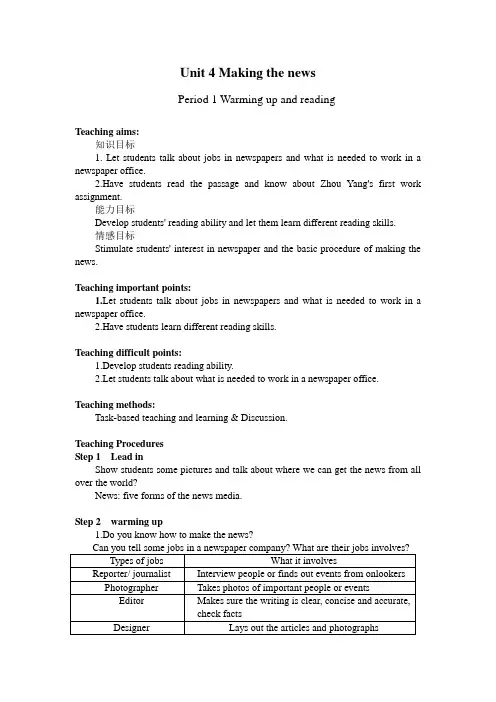
Unit 4 Making the newsPeriod 1 Warming up and readingTeaching aims:知识目标1. Let students talk about jobs in newspapers and what is needed to work in a newspaper office.2.Have students read the passage and know about Zhou Yang's first work assignment.能力目标Develop students' reading ability and let them learn different reading skills.情感目标Stimulate students' interest in newspaper and the basic procedure of making the news.Teaching important points:1.Let students talk about jobs in newspapers and what is needed to work in a newspaper office.2.Have students learn different reading skills.Teaching difficult points:1.Develop students reading ability.2.Let students talk about what is needed to work in a newspaper office. Teaching methods:Task-based teaching and learning & Discussion.Teaching ProceduresStep 1 Lead inShow students some pictures and talk about where we can get the news from all over the world?News: five forms of the news media.Step 2 warming up1.Do you know how to make the news?Step 3 Pre-readingGet the students to discuss the importance of qualities a good news reporter needs to have. And why?Qualities:Good communication skills,.Enthusiasm for the job,higher level of education,hard working,Curious, active personality...enthusiasm = a strong feeling of interest and enjoyment about something and and eagerness to be involved in it.be full of enthusiasm about…热衷于……Step 4 Reading1.SkimmingWhat’s the main idea of this passage?This passage is about _______’s first _______ at the office of China Daily. And his ________ with his new _____, Hu Xin.Now please listen to the passage and underline the questions which Zhou Yang asks. Try tolook at the way the questions develop.⑴Can I go out on a story immediately?⑵What do I need to take with me?⑶What do I need to remember when I go out to cover a story?⑷What should I keep in mind?⑸Why is listening so important?⑹But how Can I listen carefully while taking notes?⑺Have you ever had a case where someone accused your journalists of getting the wrong end of the stick?2. ScanningTrue or False questions.(TFTFFF)1, Don’t go out on a story on your own at first.2, Take a notebook, a pen as well as a camera.3, Be curious and ask different questions to get all the information4, Talk too much during the interview.5, A reporter doesn’t need to listen to the detailed facts.6, We can always use small recorders to make sure that we get all our facts straight.3 . Careful readingPart 11.When could Zhou Yang cover a story by himself?Not till he is more experienced.2. Why is there no need for him to carry a camera?Because he will have a professional photographer with him to take photographs. Part 2:What does Zhou Yang need to remember when he goes out to cover a story?1.You need to be ______ and able to tell when people are ___________. In that case, you must use __________ or ___________ to find out the truth.2. Don’t be ____, don’t talk too much yourself and must _________________ carefully.3. While listening, you can use ______________ to make sure that you get all the facts ________. It also can provide ______ to support your story, if you are accused.Part 3: Are the following statements true or false?(FFFF)Hu Xin never had a case where somebody accused his reporters of getting the wrong end of the stick.The footballer was accused because he lost the game.The footballer admitted in the interview that he had taken some money from the man.The reporters found out the truth from the footballer’s words.Step 5 RevisionZhou Yang’s notes1.The skills needed2.The importance of listening3.Stages in researching a story4.How to check facts5.How to deal with accusations of liesStep 6 Homework1. Read the text by yourself and finish Ex 1 & 3. (P27-28)2. Read and find out the useful words and expressions in the reading text.。
高二英语预习提纲及学案Book5
Unit4 Making the news编写人:韩波
第一课时集中识词
[预习探究] Try to spell out the new words.(5 minutes)
A)根据英文解释写出该单词
1. a person whose profession is journalism
2.someone you work with
3.very keen and excited about something that is going to happen or about something you want to do
4.gain sth. by one’s ability, efforts or behaviour or obtain sth.
5. a date or time before which sth. must be done or completed
6. a situation that exists especially as it affects a particular person or group; an example of a particular situation, problem etc.
7.done in a way that is intended or planned
8.feeling very ashamed and sad because you have done something that you know is wrong
9.one of the parts that something, such as an object or place is divided into; a separate part of something that is written, such as a book or
newspaper
10.including every possible detail
B)根据词性和汉语意思写出单词,并进行适当拓展
1.(n.)职业;专业→professional(adj.)专业的;职业的;
→(n.)专业人员,教授
2.(n.)照片,(vt.)给…照像→(n.)摄影师
3.(vt.)集中;聚焦→(n.)
4.(adj.)犯罪的;有罪的;内疚的→(n.)有罪;罪状5.(adj.)技术上的;技术方面的→(n.)技术
[三维目标] Teaching aims: Memorize the new words and expressions.
[教学重难点] Important points: Usage of verbs
[课时安排] 1 period
[学习过程]Learning procedures:
Step 1 Correct the pronunciation of the students. (5 minutes)
Read after the tape. Then the teacher asks students to read the new words by themselves. Step 2 Skills in memorizing the new words. (15 minutes)
The teacher analyses the structure and usage of the new words briefly.
Step 3 Have a dictation(5 minutes)
Ask some students to come to the blackboard.
[合作释疑]
Step 4 Consolidation(10 minutes)
根据首字母或中文提示写出所缺的单词。
1.I decide to devote all my life to it whatever p I enter.
2.I am so e to return home, for I miss my family very much.
3.Professor Smith, along with his assistants, is working on the project day and night to meet the d .
4.The couple felt (有罪的)about not visiting their parents more often. 5.Last Friday the doctor gave the patient a (彻底的)check-up.
6. In some (情况)people had to wait several weeks for an appointment.
7.Many children have formed the habit of reading but not taking notes (同时).
8. Both professionals and (业余爱好者)may be allowed to take part in this
kind of sports.
9. He made such an impossible promise that he had to face a (窘境).
10.In his talk Dr Lin referred to the help he received from his (同事)in his research.
[当堂检测]Step 6 Have a test(5 minutes)
(一)写出下列汉语所对应的英语单词
1.n.记者2.vt.涉及;包括;使参与(卷入)…
3.n.编辑4.n.照片vt.给…照相
5.n.摄影师6.n.摄影
7.adj.难忘的8.n.任务;分配
9.adj.快乐的10.adj.令人钦佩的
11.adj.不同寻常的12.vt.帮助;援助
13.n.助手;售货员14.vt.递交
15.n.职业;专业16.adj.专业的;职业的n.专业人员
17.n.同事18.adj.渴望的
19.v.集中;聚集20.n.业余爱好者
21.vt.更新;使现代化22.vt.获得
23.vt.评估;评定24.vt.告知;通知
25.n.最后期限26.n.参加面试者;接受采访者
27.adv.期间;同时28.n.情况;病例;案例
29.vt.指责;控告30.n.指责;谴责
31.adv.故意地32.vt.否认;拒绝
33.adj.怀疑的34.adj.有罪的;内疚的
35.n.(进退两难的)困境36.n.& vt.要求
37.adj.要求很高的;费力的38.vt.出版;发行
39.n.抢先获得的新闻40.n.部分;节
41.adj.简明的42.adj.富于想象力的
43.adj.技术(上)的;技巧方面的44.adv.技术上
45.adj.彻底的46.adj.有天赋的
47.adj.合乎语言习惯的48.n.家庭主妇
49.n.罪行;犯罪50.n.版本
51.n.部门;处;系52.adj.精确的;正确的
53.adj.年长的;高级的54.vt.磨光
55.adj.主要的;首席的n.首领;长官
56.vt.赞成;认可;批准
57.vt.加工;处理n.程序
58.n.底片;否定adj.否定的;消极的
59.n.约会;任命
(二)写出下列汉语所对应的英语短语
1.集中;全神贯注于2.依靠;依赖
3.因…指责或控告…4.为了(做)…
5.在……前面
[课后作业]Homework
Prepare lessons after class.。